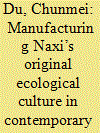| Srl | Item |
| 1 |
ID:
153449


|
|
|
|
|
| Summary/Abstract |
Universally recognized global processes are rapidly expanding to the farthest corners of the planet, influencing the economic, social, political, cultural, and other spheres of everyday life in the largest and smallest ethnic groups of different countries. These include the Naxi in China, who began to feel their palpable effects on the eve of the new millennium. This work analyzes the position of the Naxi people in the context of globalization, describing the main problems and threats this ethnic group is encountering in the 21st century, and the role of PRC ethnic policy in solving these problems.
|
|
|
|
|
|
|
|
|
|
|
|
|
|
|
|
| 2 |
ID:
141163


|
|
|
|
|
| Summary/Abstract |
For over a decade, original ecological (yuanshengtai原生态) has contested ethnic (minzu) as an influential framework in representing minority folk culture in Chinese official and popular media. This article explores the ideological implications of such a shift in the context of state-minority relationships. By examining Han elites’ invention of the neologism and Naxi elites’ adaptations, I argue that YST transforms local ethnic categories into a transethnic, translocal, and transnational concept, and therefore allows both the nation state and the minority groups to promote their own versions of ethnic identities. Compared to the antagonistic model between state domination and minority resistance, YST reflects a shift from minority political self-determination to cultural self-representation in the drastically changing global environments.
|
|
|
|
|
|
|
|
|
|
|
|
|
|
|
|